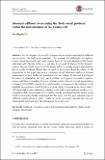Biosocial selfhood : overcoming the ‘body-social problem’ within the individuation of the human self
Abstract
In a recent paper, Kyselo (2014) argues that an enactive approach to selfhood can overcome ‘the body-social problem’: “the question for philosophy of cognitive science about how bodily and social aspects figure in the individuation of the human individual self” (Kyselo, 2014, p. 4; see also Kyselo and Di Paolo (2013)). Kyselo’s claim is that we should conceive of the human self as a socially enacted phenomenon that is bodily mediated. Whilst there is much to be praised about this claim, I will demonstrate in this paper that such a conception of self ultimately leads to a strained interpretation of how bodily and social processes are related. To this end, I will begin the paper by elucidating the body-social problem as it appears in modern cognitive science and then expounding Kyselo’s solution, which relies on a novel interpretation of Jonas’s (1966/2001) concept of needful freedom. In response to this solution, I will highlight two problems which Kyselo’s account cannot overcome in its current state. I will argue that a more satisfactory solution to the body-social problem involves a re-conception of the human body as irrevocably socially constituted and the human social world as irrevocably bodily constituted. On this view, even the most minimal sense of selfhood cannot privilege either bodily or social processes; instead, the two are ontologically entwined such that humans are biosocial selves.
Citation
Higgins , J 2018 , ' Biosocial selfhood : overcoming the ‘body-social problem’ within the individuation of the human self ' , Phenomenology and the Cognitive Sciences , vol. 17 , no. 3 , pp. 433-454 . https://doi.org/10.1007/s11097-017-9514-2
Publication
Phenomenology and the Cognitive Sciences
Status
Peer reviewed
ISSN
1568-7759Type
Journal article
Rights
© The Author(s) 2017. This article is distributed under the terms of the Creative Commons Attribution 4.0 International License (http://creativecommons.org/licenses/by/4.0/), which permits unrestricted use, distribution, and reproduction in any medium, provided you give appropriate credit to the original author(s) and the source, provide a link to the Creative Commons license, and indicate if changes were made.
Collections
Items in the St Andrews Research Repository are protected by copyright, with all rights reserved, unless otherwise indicated.

